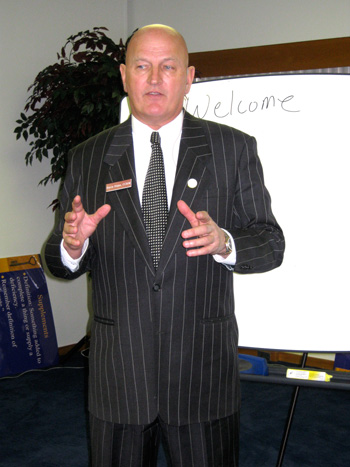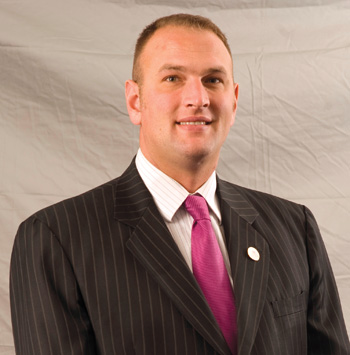he desperate ones not to spend money with us – we would rather they come to class first to see if they want to be in the business. The reason is because it takes so long to get the proper philosophical alignment on-site at their place with the distractions that go on. As they’re trying to run their business and you’re trying to help them, sometimes it’s difficult to get their undivided attention. If you don’t really want to partner with us, we don’t want to fail as a consultant.”
Experience
Any Google search for consultants will yield page after page of professionals who promise to turn your company into a mega-profitable place where people love to work. So who should you choose? In Claypool’s mind, choosing someone who has experience in your industry is a must.
“It should be someone who has walked miles and miles in your shoes,” he says. “They should have real-world business experience and have had success in your industry and done things to separate themselves from their competitors.”
Dunn says that a consultant should not just have real world experience, but also success as a business owner.
“One question to ask them is, ‘If you’re so good at this, why aren’t you running your own shop?’ Consultants are often made up of a variety of profiles – someone who failed at a business, someone who sold the business (which, for the life of me, I don’t know why anyone would do that) or someone who has never been in the business. A lot of them never actually practice anything; they’re more like the armchair quarterback.”
Daren Fristoe, a 24-year consultant and head of The Fristoe Group, adds that the consultant should be specific to your industry.
“It should be someone who has done whatever it is that you do before – and done it for a long time.”
Claypool says that people who have written for trade magazines in a particular industry or been speakers at industry trade shows tend to be recognized experts in their field and thus are good candidates to examine your business. But he advises to ask them for references before hiring them. Fristoe agrees, adding that you should also ask them for testimonials.
“It’s kind of like the Angie’s List idea, where you literally can check to see if someone did what they said they were going to do,” he says.
F is for Fearless 
The consultant you choose should also be fearless and unabashedly honest and not afraid to tell you “like it is” once they look through the fishbowl and observe the goings-on of your company, says Claypool. Fristoe seconds that, saying that a consultant should be painfully honest with a business owner.
“If something doesn’t fit, they should tell you,” he says. “They’ll say, ‘I can’t help you with this, but here’s someone who can.’ I respect that more than someone who’s trying to wing it.”
Fristoe adds that the consultant, after doing an initial audit of a business’s operations, should also be honest and up-front with what the owner needs at what price point. “You may not need the gold standard product but just the bronze.”
Compensation
Fristoe explains that consulting can be done on a project basis, hourly basis or retainer. He believes it’s important that consultants offer a wide range of product offerings and price points. Claypool agrees, adding that companies should look at a wide range of consultants to find a price they’re comfortable with.
“Consultants can be very expensive,” he says. “High-end ones can charge $2,500 to $5,000 a day, and small businesses typically can’t absorb that cost. My rate is $1,500 a day. And if someone says I need more than a day of your time, I tell them I will give them 40 hours of consulting for ‘X’ amount of dollars, which amounts to less than $1,500 a day, and they don’t have to do those 40 hours in succession.”
Claypool is also flexible with his schedule, realizing that trying to get things done during the chaos of regular business is usually impossible. That’s another thing business owners should look for in a consultant: someone who’s willing to work around their business hours and work non-traditional hours with them.“I always tell my clients that if they want to start talking business at the end of the day through dinner time, I’m open to that,” he says. “Or on Saturday, when we’re not constantly interrupted so we’ll probably get more done that way.”
Mental Preparation
Business owners may convince themselves that they need a consultant, but they may not be ready mentally to accept direction from an outsider. But Claypool
says it’s crucial for them to get in the right mindset.
“They need to tell themselves, ‘I am spending this money for the purpose of taking my business to the next level,’” says Claypool. “It’s letting go of their ego. We don’t all know everything. The owner must say, ‘I admit I don’t know everything, therefore I’m going to spend some money and I want to see some return on that investment, so I’ll drop my guard and put my shields down and go into listen mode.’”
Claypool says the business owner has to be open to what the consultant has to say based on their assessment of the business and be willing to go out on a limb and make some changes. Also important is the owner explaining to the staff in advance that someone will be coming to look at the business.
“The owner might say, ‘I’m bringing in a consultant who’s an expert in this field, and I don’t know about you guys, but I want to be in business and want to be able to provide you with jobs long term. This consultant will help us grow and understand what we need to increase sales or customer satisfaction. And I’m hoping everyone will give him their honest opinion.’”
Claypool says when the owner sets things up that way, the employees will tell the consultant what they feel, openly and honestly, provided their identities are kept confidential. The consultant can then compile their responses and create a game plan, decide on a benchmark and establish when to touch base with the owner.
ROI
How does a business owner know if the hard-earned money they’re shelling out for a consultant is producing results? Claypool advises that owners should establish benchmarks with the consultant before the actual consulting begins, establish what the deliverables will be, then measure the results in an agreed upon timeline.
A business owner may be so busy in their day-to-day activities that they may not have an epiphany as to when is the right time to hire a consultant. It might just come from a peer who talks highly of an experience they had with a consultant. Or they could meet a consultant at an association meeting.
Says Claypool, “At some point, if they start having some health issues from stress, someone needs to say, ‘Hey, you need some help in here, someone to come in and help run the show a little differently.’”
Before You Hire a Consultant, Ask:
1. Why did you decide to become a consultant?
2. How will we measure the results of our work together?
3. How will you communicate with me throughout the process, and how often?
4. What was the biggest mistake you’ve ever made in business, and what did you learn from it?
5. May I have the names, phone numbers and email addresses of five people you’ve consulted for?
Ready to Quit Your Day Job?
So you think you have what it takes to be a consultant? Ask yourself a few
questions first:
1. Do you truly have the expertise to share with others?
2. What will happen to your business if you take time out to consult?
3. Would others describe you as inspirational?
4. Do you like to travel?
Claypool advises to try giving your services away to someone first, then ask them what they feel those services would be worth on a daily or weekly basis.
Fristoe cautions that the consultant wannabe understands they’re creating a separate entity with its own tax ID number, business cards, website, etc., and thus incurring the risk of offering counsel that may or may not be sound advice.
“You’re exposing yourself as an expert or leader in your field to dispense advise,” says Fristoe. “You certainly need a lengthy level of experience in the field, and it needs to be well-rounded and not just in your specific discipline. People walk right out of school thinking they’re a consultant, but I think you need time in the trenches. You have to have experience running a business or being in a management position or role where you had accountability. For example, I have 24 years of experience and have seen a lot of things in a variety of industries and held many senior leadership roles. I don’t know everything, but I do know of a number of things that have worked in the past.”
Robby Dunn of Masters School of Auto Body Management believes a consultant wannabe should ask themselves one main question: “Do I have a lot of patience?”
“I’ve learned that it requires a lot of that,” says Dunn. “You think you have wonderful ideas, and you probably do, but things seem to never happen as fast as a shop owner or a consultant would like them to. My first advice is to be patient and understand that meaningful change is a matter of months, not overnight.”













